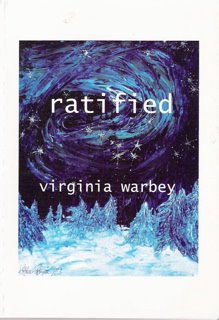
'The Alchemy of the Unexpected'
Novelist, poet and librarian Virginia Warbey died tragically young in a car crash in June 2004. Probably her best-known works are still her novels; The Ropemaker’s Daughter and The Carradine Diary, both published by Diva under her married name Virginia Smith, now modern classics of lesbian literary fiction. But a second collection of her poetry, entitled RATIFIED, has been published posthumously and when it came into my possession at the recent Torbay Poetry Festival, it took only a quick glance through its 80-odd pages to leave me determined to review it.
Poet Vicki Feaver has praised Warbey’s poetry, saying: ‘These are poems ... with a distinct voice and style: love poems that reinvent the love poem, ‘make it new’, as is the gifted poet’s task.’ I agree with this, and would add that it is Warbey’s ability to achieve such an intensely intimate tone in her love poems that makes her best pieces so memorable. One of the strongest instances of this is 'David and Bathsheba', a love poem that sidesteps the obvious problems attached to depicting such a well-known biblical couple, written with a rich attention to detail yet without sentimentality, seen with an artist’s eye and described with a poet’s ear:
'I was lost the first night I saw her,
kneeling at the courtyard pool, her skirts
gathered about her waist,
cypress oil threading gold across her breasts;
a web of want to hook the heart of a king.
She came when I summoned her.
She lay with me,
and the radiance that spilled into the space
between our bodies
dazzled into dust the yoke of our vacuous pasts'
Displaying an innate ability to ‘close’ a poem succinctly and with an echoing resonance that sticks in the mind long after the book has been closed, Warbey ends the poem:
'for we have tasted God on each other’s lips,
Bathsheba and I, sharp as poison.
We arise each day from a sleep like death,
and drink again.'
This is a collection redolent with such biblical keynotes, either quick passing references - ‘a little Lazarus, unsteady on his feet’, for instance, in a poem about a favourite cat who ran out of lives - or stories lifted whole from the scriptures and lived in, inhabited by the poet until they have been made ‘new’, as Feaver put it, reinvented in Warbey’s own voice and idiom.
'Cedarwood' is written in Joseph’s voice, the young carpenter tormented by the thought of his wife Mary’s pregnancy by another man, as he supposes:
'I watch you through the window as I work.
I watch you at the well and in your father’s house.
You stoop down and your blue skirts crumple against your skin,
sticking to your thighs in the fly-blown heat.
You lift yourself carefully these days.
The cedarwood grows warm beneath
my hands, begins to darken.'
Similarly, 'The Wedding at Cana' is seen through the eyes of a wedding guest, particularly astonished by Jesus’ transformation of the water into wine since he was ‘The man I’d barely noticed. / The one least likely.’ This, Warbey argues, is ‘what it’s like sometimes’ - 'the alchemy of the unexpected’ - where the one least likely to change your life is often the one who is most able to do so.
This note in her poetry, an easy conversational tone which nonetheless manages to maintain rhythm and tension, is what best characterises Warbey’s work. The voices change, may rise and fall, but they remain defiantly poetic, as here in 'Magdalen', where her ideologically provocative opening lines ‘If they tell you that it wasn’t love, / don’t believe them’ strike a colloquial note that are soon followed by the embarrassingly intimate and closely-observed
'I bathed his feet with the scent of tears,
touched my lips to the dust
that lived
in the veins of his ankles'
demonstrating why Virginia Warbey won no fewer than 13 competition prizes for poems in this second collection.
But perhaps that’s where I come to my only reservation about RATIFIED; too many of these pieces do read like competition poems. Well-written, yes, but perhaps a little too well-written and self-conscious to really lift the hairs on the back of the neck. Something deeper always seems to be being held back, smoothed over and planed down, hidden like Joseph’s frustration and jealousy in her poem 'Cedarwood'. Now and then it can be glimpsed, in the turn of a phrase or in a beautifully achieved image, almost ready to emerge but not quite, as though the poet is pacing herself, attempting to master the form that could contain her.
It’s a tragedy, of course, that Virginia Warbey will never be able to develop her work beyond this second collection, to transform herself into the accomplished and award-winning poet I have no doubt she would have become if she had lived. But what we do have in this promising second collection, RATIFIED, is a poetry worth turning to for its richness of imagery, its keen and questioning intelligence, and its strong rhythmic sensitivity; the poignant last snapshot of a talented poet, poised forever on the very brink of initiation.
........
To order a copy of RATIFIED by Virginia Warbey (Merdon Marque, December 2004) the price is £6.95, plus £1.00 UK post & packing. Send orders with cheques, made payable to Chandlers Ford Writers (VW poetry), to Claire Gradidge, 8 Forest Road, Hants, SO53 1LZ.
Alternatively, you can order online at amazon.co.uk
No comments:
Post a Comment